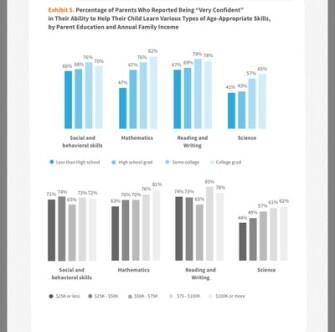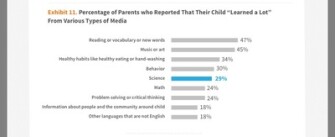UPDATED
Only about half of parents are “very confident” in their ability to help their children with science, according to a new survey out Thursday. Compare that with the 7 out of 10 parents who feel they can help their children develop reading and writing, math, and social-emotional skills.

Not surprisingly, parents with lower levels of education felt less confident about their ability to help their children with science concepts at home than did parents with higher levels of educational attainment.

Most parents connected their low confidence levels to a lack of content knowledge, not knowing how to spontaneously answer questions like why leaves change color, for instance. Some parents struggled with answering complex science questions like “Do trees breathe?” in ways their kids could understand.

The survey of 1,442 parents of children ages 3 to 6 was conducted last year between Aug. 31 and Oct. 8. Of the respondents, 909 reported a yearly income below $50,000.
Researchers also spoke with 65 parents in eight focus groups and did 20 home visits with 11 families. The U.S. Department of Education’s Ready To Learn Initiative commissioned the survey.
Achievement gaps in science begin early and continue into high school and beyond, the survey authors warn. If young people aren’t exposed to science early on, they’ll likely have little interest in science and perform poorly in the subject at school. So they consider the survey’s finding that about half of parents said skills like reading, sharing, and patience are more important to learn at home than science rather worrying.
But research shows that parent involvement can make a difference.
And parents, according to the survey, are open to giving science a go if they have the proper resources. Seven out of 10 parents surveyed said they would jump more readily into science investigations with their children if they had access to activities that use everyday materials to teach scientific concepts.

As of right now, however, parents feel more comfortable doing daily learning activities like reading and household chores with their children, according to the survey. Of those parents who did report doing daily science activities with their children, most (36 percent) said they “explore the outdoors.”

Many families say their children watch science-related TV shows like “Sid the Science Kid” and “The Magic School Bus,” but few parents think these resources have helped their children learn a lot of science.

“This survey tells us that parents, regardless of income, want to give their children a strong start in the sciences, but many just aren’t sure how,” said Shelley Pasnik, the director of the Center for Children and Technology, a group that investigates how tech can improve teaching and learning in classrooms and communities. She is also the vice president of the Education Development Center, the group that coauthored the survey along with the nonprofit research institute SRI International. “While parents and guardians we spoke to say they are comfortable using books to promote reading and counting everyday objects to teach math, they would like help to take advantage of their child’s natural curiosity about the world.”
This post has been updated to include the name of one of the coauthors of the study, SRI International.
Images: Education Development Center, “What Parents Talk About When They Talk About Learning” (2018)
Related stories: